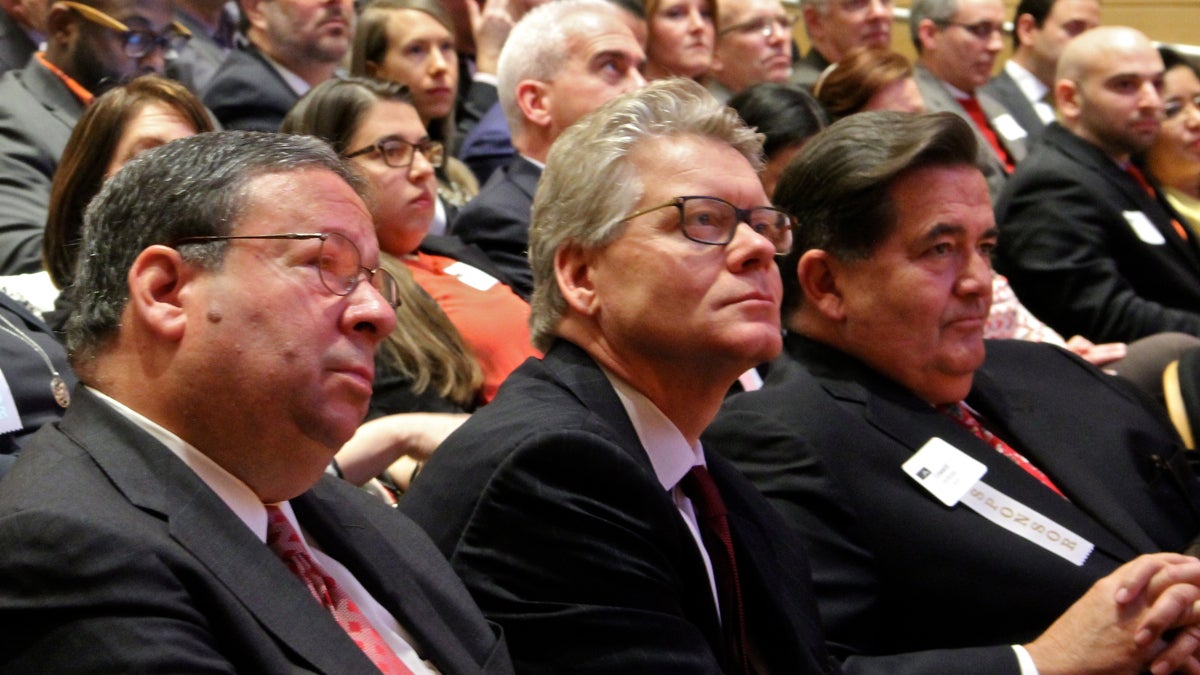Chamber of Commerce moves to block Philly law aimed at bolstering pay equity

The Greater Philadelphia Chamber of Commerce, led by Rob Wonderling (center), is challenging Philadelphia's wage history bill, which prohibits employers from asking for a prosepective employee's wage history. (Emma Lee/WHYY)
Philadelphia is headed to federal court to defend a law aimed at combating gender pay discrimination after the Chamber of Commerce for Greater Philadelphia sued on Thursday to block it.
In January, City Council unanimously passed a law barring companies from asking potential hires about their previous earnings as a way of ensuring that women are not underpaid.
Violators could be fined $2,000 per violation starting next month. But the chamber hopes a federal judge will halt the law before then, arguing that the regulation infringes on the right of businesses to free speech.
Preventing companies from asking a potential employee about past salaries is a “radical and unconstitutional” move, wrote Miguel Estrada, who is representing the chamber, in the suit.
Knowing a candidate’s wage history allows employers to better understand “whether a candidate is worth pursuing,” and “helps employers ascertain the market value or salaries for comparable positions,” Estrada wrote.
And so, legislating a ban on the question will hurt businesses, he argues, in addition to limiting the First Amendment rights of companies.
The law’s “severe penalties” could even force some businesses to shut down, the suit claims.
Women in Pennsylvania earn 79 cents for every dollar paid to a man for comparable work; for African-American and Latina women, the disparity is even greater.
Supporters of the law have maintained that the wage gap takes hold early on in someone’s career. By taking a worker’s past earnings out of the equation, they say, women and men may start receiving more equitable salaries.
Rob Wonderling, who leads the chamber, said no evidence suggests the city’s salary-history law would achieve this. Instead, he said, it’s just another layer of government red tape.
“Our local government has developed a pattern and has created a regulatory environment that is onerous to Philadelphia employers and Philadelphia workers,” Wonderling said.
“This one issue in particular has had an absolute visceral effect among our members as the proverbial straw that has broken the camel’s back,” he said.
Neither Wonderling nor any other chamber member attended a public hearing in City Council about the legislation, although the group submitted written testimony objecting to the law.
Wonderling proposed alternative ways of approaching the law that he said would be less burdensome to businesses. He suggested requiring companies to conduct self-evaluations or allowing salary-history questions but barring employers from hiring based solely on past earnings.
“We’re not just talking about it and saying, ‘Oh, it’s terrible, a Latina is getting paid 55 cents or something like that for every dollar a white male is,’ ” the bill’s sponsor Councilman Bill Greenlee told the Inquirer. “We’re trying to do something.”
A spokeswoman with the mayor’s office said she is confident the law will withstand the challenge.
Philadelphia was the first city in the country to pass law barring employers from asking salary-history questions, but other cities have followed the lead. Just this week, New York City approved a law banning employers from asking about past salaries.
WHYY is your source for fact-based, in-depth journalism and information. As a nonprofit organization, we rely on financial support from readers like you. Please give today.




